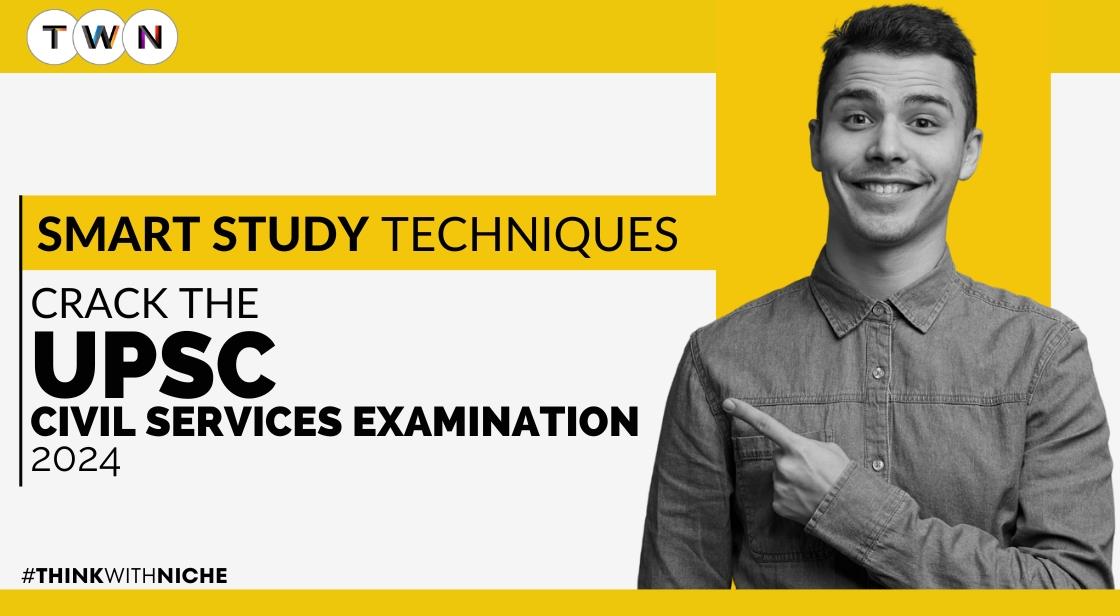Smart Study Techniques for Cracking the UPSC Civil Services Examination 2024

Blog Post
Aspiring to scale the daunting peak of the UPSC Civil Services Examination (CSE)? In 2024, the competition intensifies, demanding not just relentless effort but also strategic smarts.
This comprehensive guide equips you with the latest and most effective study techniques, empowering you to navigate the vast syllabus, optimize your time, and excel in all stages of the exam.
Forget outdated rote memorization! The key to unlocking the coveted UPSC code lies in active engagement. Dive deeper into concepts, analyze their real-world implications, and forge connections that solidify understanding.
Visualize complex information with mind maps and flowcharts, transforming passive learning into an immersive experience. Don't be a lone warrior – leverage technology and online resources. Utilize credible platforms for curated content, connect with fellow aspirants for knowledge exchange, and join webinars by subject-matter experts to stay ahead of the curve.
But remember, the UPSC CSE is a marathon, not a sprint. Prioritizing your well-being is crucial. Schedule regular breaks, fuel your body with nutritious choices, and embrace practices like meditation for stress management.
Consistent sleep is your brain's best friend, ensuring optimal cognitive function and information retention. Remember, a healthy mind and body are the pillars of UPSC success.
Throughout this journey, remember two mantras: consistency and adaptability. Tailor your study approach to your unique learning style, experiment with different techniques, and refine your strategy as you progress. Embrace the latest insights and exam pattern updates to stay ahead of the curve.
Most importantly, never lose sight of your goal. Let unwavering focus and a positive attitude be your guiding stars as you conquer Mount UPSC.
This article delves deeper into these powerful strategies, providing actionable steps and relevant examples tailored to the 2024 UPSC CSE. Are you ready to embark on your UPSC adventure? Let's begin!
Wishing you good luck with your UPSC journey!
Mastering UPSC: Effective Strategies for Civil Services Exam Preparation
First, but most Important step to start UPSC Civil services examination preparation
Dispelling Common Misconceptions: Navigating UPSC Preparation with Confidence
Stepping into UPSC preparation often brings along various preconceived notions, such as the following doubts, for instance:
-
The UPSC CSE exam syllabus is extensive and ambiguous, making it seemingly impossible to cover entirely.
-
UPSC General Studies foundation courses demand a significant amount of time, and missing even a single class might lead to challenges in catching up.
-
Aspirants are required to read numerous books for each subject and simultaneously create notes for every topic on a daily basis.
-
Some believe that merely learning the syllabus is adequate for performing well in the exam, even without consistent practice of mock tests.
-
There is a misconception that Prelims and Mains are entirely distinct exams, requiring separate and distinct preparations for each.
Navigating through these doubts and misconceptions is crucial for aspirants to approach UPSC preparation with a clear and informed mindset.
2024 UPSC Civil Services Examination (CSE) Syllabus Overview
Aspiring to crack the prestigious UPSC Civil Services Examination (CSE) in 2024? While the official notification arrives on February 14th, you can jumpstart your preparation using the 2023 syllabus – it remains largely unchanged. Remember, the UPSC journey is a marathon, so understanding the vast syllabus is crucial.
UPSC CSE Exam Stages:
The UPSC CSE comprises three stages:
1. UPSC CSE Prelims:
This objective-based screening test has two papers:
-
General Studies (GS Paper-I): 100 questions, 2 hours, 200 marks (cutoff-based)
-
Civil Services Aptitude Test (CSAT): 80 questions, 2 hours, 200 marks (qualifying with minimum 33%)
2. UPSC CSE Mains:
This descriptive exam has nine papers:
-
Essay: 1 paper, 3 hours, 200 marks
-
Language Papers: 2 papers, 3 hours each, 300 marks each
-
General Studies Papers: 4 papers, 3 hours each, 200 marks each
-
Optional Papers: 2 papers, 3 hours each, 200 marks each
3. Personality Test (Interview):
This final stage assesses personality and leadership potential, carrying 275 marks.
Understanding the UPSC CSE Prelims:
The Prelims syllabus covers diverse topics across:
-
GS Paper-I: Current affairs, Indian history & national movement, Indian and World Geography, Indian Polity & Governance, Economic & Social Development, General Science
Remember: Negative marking applies to both GS Paper-I and CSAT. Clearing the Prelims qualifies you for the Mains.
Deciphering the UPSC CSE Mains:
The Mains syllabus delves deeper into various domains:
-
Essay: Requires analytical and writing skills on diverse topics.
-
Language Papers: Test language comprehension and expression in English and a chosen Indian language.
-
General Studies Papers: Cover Indian heritage, governance, social issues, international relations, ethics, and integrity.
-
Optional Papers: Choose two subjects you excel in for in-depth analysis.
Understanding the UPSC CSE Personality Test:
While there's no set syllabus, focus on:
-
Personal details: Be prepared to discuss your background, interests, and experiences.
-
Current affairs: Demonstrate knowledge and understanding of recent events.
-
Analytical and critical thinking: Answer hypothetical and open-ended questions thoughtfully.
-
Social traits and leadership potential: Showcase your communication, interpersonal skills, and potential for public service.
Also Read: Discover Your Direction and Meaning in Life: Embrace Change
Strategies for UPSC Civil services examination preparation
1. Identifying Strengths and Weaknesses:
- Attempt previous years' question papers for each subject.
- Analyze your performance to identify areas requiring more attention.
- Leverage resources like subject-specific mock tests and expert analysis to pinpoint your weak spots.
2. Tailoring Your Preparation:
-
Based on your strengths and weaknesses, allocate more time to weaker subjects while revising strong ones strategically.
-
Choose study materials that align with your learning style and cater to specific sections or subjects.
-
Join online forums or study groups to discuss doubts and learn from peers with different strengths.
3. Time Management and Planning:
Time Management and Planning: Your Secret Weapon in the UPSC CSE Battle
Conquering the UPSC CSE requires mastery over not just content, but also your time. Let's delve into strategies for effective time management and planning:
4. Craft a Personalized Schedule:
-
Analyze your learning style: Are you a morning lark or a night owl? Plan your study slots accordingly.
-
Consider external factors: Account for work, family commitments, and social activities when creating your schedule.
-
Be realistic: Don't over-schedule yourself. Include breaks, meals, and leisure time for mental well-being.
-
Utilize tools: Use planners, calendar apps, or online scheduling platforms to visualize and manage your time effectively.
Example: If you're a morning person, dedicate the first 2-3 hours to intensive subject study, followed by lighter revision topics or current affairs analysis in the afternoon. Schedule breaks every 45-60 minutes to avoid burnout.
5. Embrace the Pomodoro Technique:
-
Divide study sessions into 25-minute "Pomodoros" followed by 5-minute breaks.
-
During each Pomodoro, focus on a single task without distractions. Use apps or timers to stay on track.
-
After four Pomodoros, take a longer break (15-20 minutes) to refresh and recharge.
Example: Use Pomodoros for focused answer writing practice, mock test attempts, or in-depth subject analysis. Track your productivity over time and adjust the duration or intervals based on your needs.
6. Mock Tests: Your Performance Barometer:
-
Regularly practice mock tests for both Prelims and Mains, simulating the actual exam environment.
-
Analyze your results meticulously, identifying recurring errors in specific topics or question types.
-
Adjust your study approach based on the analysis. Allocate more time to your weaker areas and refine your answer-writing techniques.
Example: If you consistently struggle with Time Management questions in the CSAT paper, devote additional time to practicing related concepts and attending doubt-clearing sessions.
7. Stay Agile and Adapt:
-
Unexpected events or changes in the syllabus might necessitate adjustments to your schedule. Be flexible and willing to adapt.
-
Regularly review your progress and performance. If needed, revise your schedule, study materials, or even your optional subjects based on your evolving strengths and weaknesses.
Remember: Time management is not just about rigid schedules; it's about creating a sustainable and productive study rhythm that works for you. Experiment, analyze, and adapt to find your winning formula for conquering the UPSC CSE with time on your side.
Effective Study Techniques to Crack UPSC Civil Services Exam
Dive Deeper, Learn Smarter: Effective Study Techniques for UPSC Success
Forget rote memorization! Cracking the UPSC CSE demands active engagement with information. Here are powerful techniques to boost your understanding, retention, and overall preparation:
1. Go Beyond Facts, Embrace Concepts:
-
Don't just memorize dates and names. Analyze their significance, causes and effects, and historical context. For example, instead of simply memorizing the date of the Battle of Plassey, connect it to the decline of Mughal power and the rise of British colonialism.
-
Relate concepts to real-world examples. This strengthens understanding and aids recall. When studying environmental issues, analyze local pollution problems or government initiatives like Swachh Bharat Abhiyan.
2. Visualize Your Learning:
-
Create mind maps or flowcharts to organize complex information. This visually depicts relationships between topics, improving memory and making revision easier. Use colors, symbols, and keywords for better recall.
-
Draw diagrams and timelines to understand historical events or economic processes. Visualizing economic cycles or constitutional amendments can solidify comprehension.
3. Active Learning: Engage, Don't Absorb:
-
Summarize key points after reading each chapter or section. This forces you to process information actively and identify important themes.
-
Discuss topics with peers or mentors. Engaging in debate or explanation deepens your understanding and helps identify areas needing clarification.
-
"Teach" the material to others. This ultimate test of comprehension forces you to articulate concepts clearly and identify any gaps in your knowledge.
Example: After studying India's foreign policy, explain it to a friend without using technical jargon. This clarifies your understanding and highlights areas requiring further study.
Bonus Tip: Gamify your learning! Create flashcards, use spaced repetition apps, or set mini-challenges to engage your brain and make studying more enjoyable.
Remember: These techniques are not mutually exclusive. Combine them based on your learning style and subject matter to create a personalized and effective study approach. Experiment, find what works best for you, and watch your UPSC preparation soar!
4. Mastering the Art of Answer Writing: Your Key to UPSC Mains Success
Answer writing holds immense power in the UPSC Mains exam. It's your platform to showcase your knowledge, analytical skills, and expression. Here's how to transform your answers from good to exceptional:
1. Speed with Accuracy: Practice Makes Perfect:
-
Start with past year question papers: Choose diverse topics and practice writing within the stipulated time limit. This builds stamina and pressure management skills.
-
Join answer writing mock tests: Participate in mock tests offered by coaching institutes or online platforms. Get expert feedback and analyze your performance to identify areas for improvement.
-
Set personal time goals: Gradually reduce your answer writing time while maintaining quality. Remember, speed without accuracy is detrimental.
Example: If the answer word limit is 200 words, start by practicing within 250 words, then gradually reduce to 220, and finally aim for 200 with high accuracy.
2. Clarity, Conciseness, and Structure: Your Answer's Three Pillars:
-
Use simple and lucid language: Avoid jargon and overly complex sentences. Aim for clarity and readability.
-
Structure your answer logically: Introduce the topic, analyze it using relevant arguments, and conclude with a impactful summary. Use headings and subheadings for longer answers.
-
Present information concisely: Avoid repetition and unnecessary details. Focus on providing the most relevant points within the word limit.
Example: When answering a question on India's economic growth, start by defining the term, analyze key growth drivers like agriculture or manufacturing, discuss challenges like unemployment, and conclude with suggestions for sustainable growth.
3. Facts, Examples, and Data: The Power of Evidence:
-
Support your arguments with relevant facts, figures, and examples. Use historical data, government reports, or credible research studies to strengthen your claims.
-
Connect theory to real-world context: Illustrate your points with relevant case studies, government initiatives, or current events.
-
Quantify your arguments when possible: Use statistics, percentages, or economic indicators to add depth and credibility.
Example: Discussing India's foreign policy, mention specific diplomatic initiatives like QUAD or BIMSTEC. When analyzing poverty, cite data from NITI Aayog reports or poverty alleviation schemes.
4. Master Reading Comprehension: The Foundation of Good Answers:
-
Actively read the question: Identify keywords, understand the context, and pinpoint the specific demand of the question. Don't deviate from the question's core focus.
-
Underline key phrases and instructions: Ensure your answer addresses all aspects mentioned in the question.
-
Practice reading comprehension exercises: Regularly solve reading comprehension passages from newspapers, magazines, or UPSC-related materials.
Remember: Answer writing is an art that requires practice and refinement. Start early, experiment with different techniques, and seek feedback to hone your skills. By mastering the art of answer writing, you'll unlock a key to success in the UPSC Mains exam.
Also Read: Best Books on Self-Discipline and Self-Control
5. Amplify Your UPSC Prep: Leveraging Resources and Technology for Success
The UPSC CSE journey requires a strategic blend of traditional and modern resources. Let's explore how to leverage technology and online platforms to maximize your preparation:
1. Mine the Goldmine of Online Resources for UPSC Prep:
-
Government websites: Utilize official websites of UPSC, ministries, and departments for authentic information, reports, and study materials. Explore sites like PIB (Press Information Bureau) for current affairs updates and NITI Aayog for government initiatives.
-
Credible online platforms: Supplement your studies with curated content from platforms like. Some platforms offer free and paid resources like previous year's question papers, study notes, and expert analysis.
-
E-libraries and open access resources: Utilize platforms like Shodhganga and INFLIBNET for academic research papers, journals, and e-books related to various UPSC topics.
2. Connect and Collaborate in the Digital Sphere:
-
Online study groups and forums: Join discussions on platforms like Telegram channels or Facebook groups to connect with fellow aspirants, share doubts, and learn from diverse perspectives. Actively participate in discussions and debates to solidify your understanding.
-
Mentorship platforms and online communities: Find mentors or subject experts online who can provide personalized guidance and answer your specific questions. Consider online coaching platforms that offer live sessions, doubt-clearing mechanisms, and personalized feedback.
-
Webinars and live sessions: Attend online webinars by experts or subject-matter specialists on relevant topics. This keeps you updated on current affairs and diverse perspectives within different domains.
Example: Join a Telegram group focused on your optional subject for topic-specific discussions and sharing study materials. Participate in live sessions by renowned economists to understand complex economic concepts for the UPSC Mains.
3. Exploring Tools and Apps for UPSC Prep: Go Beyond Websites
-
Mind mapping and visualization tools: Use apps like Miro or Mindly to create visual representations of complex topics, improving retention and recall.
-
Spaced repetition apps: Utilize apps like Anki or Quizlet to revise key concepts based on scientifically proven memory techniques. These apps help you retain information efficiently over time.
-
Current affairs apps and news aggregators: Stay updated on current events with apps like The Hindu, The Indian Express, or Inshorts. Utilize features like personalized news feeds and offline reading to optimize your time.
Remember ! : Technology is a powerful tool, but use it judiciously. Avoid distractions and information overload. Utilize online resources strategically to complement your core studies and personalize your UPSC preparation journey.
Prioritizing Wellbeing for UPSC Success: Cultivating Calm amid Chaos:
The UPSC journey can be intense, demanding both mental and physical resilience. Here's how to prioritize your well-being and fuel your preparation with renewed energy:
1. Breaks are Not Breaks from Studying, They Are Fuel for It:
-
Schedule regular breaks: Plan 5-10 minute breaks after every hour of intense study. Get up, move around, stretch, or step outside for fresh air.
-
Engage in physical activity: Take short walks, do yoga stretches, or perform quick HIIT workouts during breaks. Exercise boosts blood flow, improves focus, and combats stress.
-
Practice relaxation techniques: Deep breathing exercises, meditation, or guided imagery can calm your mind and reduce anxiety. Apps like Calm or Headspace offer guided meditations specifically designed for stress management.
Example: Set a timer for every 60 minutes of focused studying. During the break, do 10 jumping jacks, open the window for fresh air, or practice a 5-minute guided meditation.
2. Sleep: Your Brain's Best Friend:
-
Aim for 7-8 hours of quality sleep each night. A well-rested mind retains information better, processes concepts more effectively, and generates creative solutions.
-
Establish a consistent sleep schedule: Go to bed and wake up at the same time each day, even on weekends. This regulates your body's natural sleep-wake cycle.
-
Create a sleep-conducive environment: Make your bedroom dark, quiet, and cool. Avoid screens for at least an hour before bed and wind down with calming activities like reading or listening to relaxing music.
Example: If you typically wake up at 7 am, aim to be in bed by 11 pm. Turn off electronics, dim the lights, and read a book to unwind before sleep.
3. Nourish Your Body, Nourish Your Mind:
-
Eat a balanced diet rich in fruits, vegetables, whole grains, and lean protein. Avoid processed foods, excessive sugar, and unhealthy fats, which can negatively impact your energy levels and concentration.
-
Stay hydrated: Drink plenty of water throughout the day to keep your brain functioning optimally. Avoid sugary drinks and opt for water, herbal teas, or diluted fruit juices.
-
Snack smart: Choose healthy snacks like nuts, seeds, fruits, or yogurt to avoid energy crashes and maintain brainpower during long study sessions.
Example: Pack a lunchbox with whole-wheat bread, grilled chicken, and a salad for sustained energy during the day. Snack on almonds or carrots with hummus instead of chips or cookies.
4. You're Not in This Alone: Seek Support and Build a Network:
-
Talk to family and friends: Share your anxieties and challenges. Their understanding and encouragement can be a source of strength and motivation.
-
Connect with fellow aspirants: Join online forums or study groups to share resources, discuss strategies, and offer mutual support. Knowing you're not alone can be incredibly motivating.
-
Seek professional help if needed: Don't hesitate to consult a therapist or counselor if you're experiencing overwhelming stress, anxiety, or burnout. Their guidance can help you develop healthy coping mechanisms and maintain emotional well-being.
Example: Join a Telegram group with UPSC aspirants from your city to have regular study sessions, discuss doubts, and celebrate each other's achievements. Talk to your siblings or close friends about your anxieties and challenges related to the exam.
Remember: Prioritizing your well-being is not a luxury; it's a necessity for UPSC success. By incorporating these practices, you'll cultivate the mental and physical resilience needed to navigate the challenges and emerge victorious.
- Last but not the Least
Remember!
-
Consistency and perseverance are key to success in the UPSC CSE.
-
Adapt and refine your study techniques based on your individual learning style and progress.
-
Stay motivated and focused on your goal throughout the preparation journey.
By implementing these smart study techniques and maintaining a positive attitude, you can significantly increase your chances of cracking the UPSC Civil Services Examination and achieving your dream career.
Disclaimer: This article provides general information and is not intended as a substitute for professional guidance. Consider consulting with an experienced UPSC CSE coach or mentor for personalized advice and support.
You May Like
EDITOR’S CHOICE












